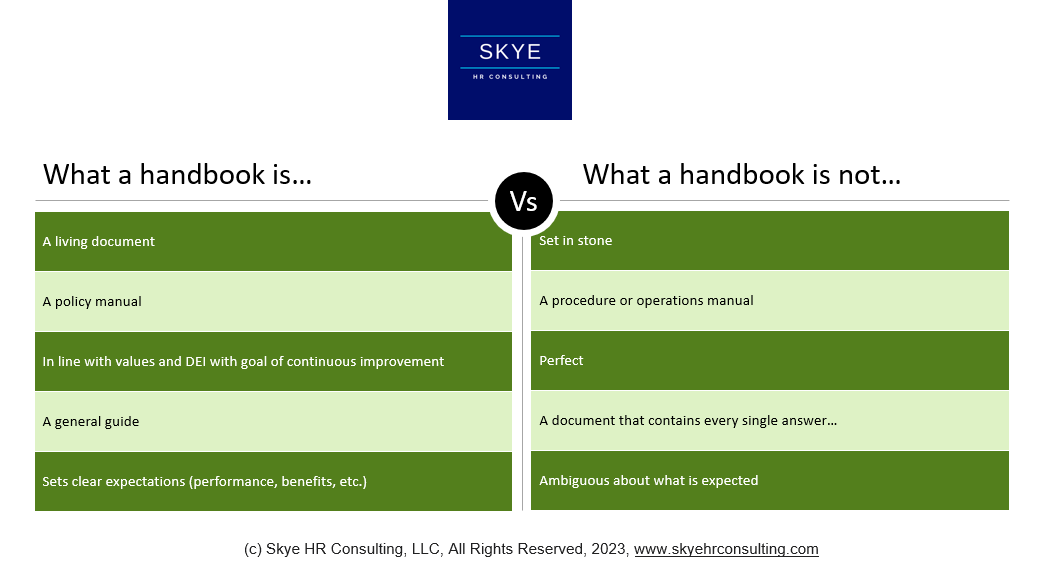Create a Handbook Employees Want to Read
A Checklist for Updating Your Employee Handbook
Does your employee handbook need updating? You’ve come to the right place!
It’s easy to overlook the importance of an employee handbook.
At its worst, a handbook is an outdated, boring read that doesn’t comply with state and federal regulations.
At its best, a handbook is an accurate, compliant, equitable, and key foundational resource for employees and supervisors.
A good handbook…
Reflects the organization’s unique values and culture
Engages the reader with good design and a “human voice” (not only legal-ese) writing style
Complies with applicable state, federal, and local rules
Clearly communicates policies, benefits, and expectations of working for the employer
Let’s start with a bit of context…
What is an employee handbook? And what is it not?
Anytime I consult with clients on a handbook rewrite, we start with the definition of a handbook. It’s important to not get stuck in the trap of writing a procedure manual. Or, putting too much weight on the policies themselves, rather than the communication and training that’s needed with a handbook update
Be sure to incorporate employee feedback
If your goal is to create an inclusive and accurate handbook, employee feedback is a must.
Why?
Because employees see things that supervisors or HR people (like myself!) often don’t see. If I would have skipped this step in the past, I would have missed existing policy inaccuracies that needed to be fixed in the handbook update. Employee feedback has also opened my eyes to the importance of using clear and inclusive language in the handbook.
Don’t underestimate the importance of visual design and writing style
A modern employee handbook doesn’t have to be a dry, boring document that no one wants to read.
In addition to mitigating liability, a well-written handbook is an effective tool for establishing your employer brand and creating a guide for employees to successfully navigate their work within your organization.
Non-traditional handbook elements…
Color
Pictures
Infographics
Bullets
Clear, direct statements
Human voice, i.e. rather than “Employees should reach out to their supervisor with questions….” consider “If you have questions, please reach out to your supervisor.”
Ensure federal, state, and local compliance
Even if you have one (1) employee working remotely outside of your home state, it’s important to ensure compliance with that state’s rules.
State regulations may vary on any of the following: Paid sick leave rules, other leaves of absence (medical, pregnancy, emergency personnel, voting, jury duty, etc.), wage and hour rules, pay rules, and more. Keep in mind some cities will have additional rules to comply with as well.
For these reasons, it’s worth the investment to ensure you have someone who is qualified write your employee handbook. Similar to ensuring someone qualified in accounting sets up your accounting policies, it’s important to ensure someone who is qualified in HR sets up your employee policies.
Learn more about options for updating your handbook here.
Other compliance updates to consider for 2023….
COVID-19 and mask policy updates
Pregnant Workers Fairness Act (new Federal law coming in June 2023)
Overtime rule update (federal guidance is on its way for May 2023)
Broadened Equal Opportunity Employment statement (especially important if it’s been a while since you updated your handbook)
Equity and inclusion updates to consider for 2023….
Paid family leave (especially for employers with fewer than 50 employees in a state without leave)
Expanding reasons for taking bereavement leave to include chosen family
Empowering employees to celebrate the holidays of their choosing
Further defining your organization’s commitment to diversity, equity, and inclusion
Pay transparency (note - this may be a state compliance requirement depending on what state(s) you operate in)
Ways to Work with Skye
Monthly Retainer HR Consulting: On-demand monthly contracted HR services customized to meet your business needs. Quickly offload HR tasks to an experienced consultant.
Leadership Training: Interactive in-person or online training tailored to your organization. Build leadership skills with relevant HR & leadership training.
Employee Handbooks: Handbooks tailored to your organization’s unique values and focused on reducing State and Federal compliance risk.
HR Strategy Session: Get quick answers to your HR questions from an HR pro. Receive expert guidance and a clear plan of action to resolve your immediate HR issues.

